Raquel Regalado faces a rematch in a Miami county district, this time with a record
In 2020, former Pinecrest mayor Cindy Lerner came within two percentage points of beating school board Raquel Regalado in the election for what was then an open District 7 seat on the Miami-Dade County Commission.
Four years later, Lerner is challenging Commissioner Regalado for the same non-partisan seat and each candidate sees the incumbent’s voting record as the main argument for voters to reject the other this time around.
“You deserve better. We all deserve better,” Lerner, a lawyer, said at a June 27 candidates forum. “That’s why I am running.”
Lerner, a former Democratic state representative, is trying to position Regalado, a Republican, as pro-development, anti-environment and catering to the special-interest donors who have given the incumbent about a 10-to-1 edge in fundraising this year.
Regalado has raised more than $1 million in the last four years and Lerner nearly $200,000 since filing for the Aug. 20 election last fall, according to campaign-finance reporting.
Regalado, 50, is brushing off Lerner, 71, as a politician with a record of rudeness to constituents while portraying herself as a heavy-lifter on the commission with a string of legislative accomplishments for her Miami-area district and beyond, including approval of a new Key Biscayne library and bringing Tri-Rail to downtown Miami while heading the tri-county board that oversees the rail service.
“I’m a happy workaholic,” Regalado, a single mother of two autistic young adults who teaches ethical leadership at St. Thomas University, said at the June 27 forum, sponsored by the Kendall Federation of Homeowners Associations. There, she ticked off county spending on District 7 roads and parks in her first term, legislation that created autism-sensitivity training for county employees and initiatives tied to improving water quality in Biscayne Bay. “It is a privilege to serve you.”
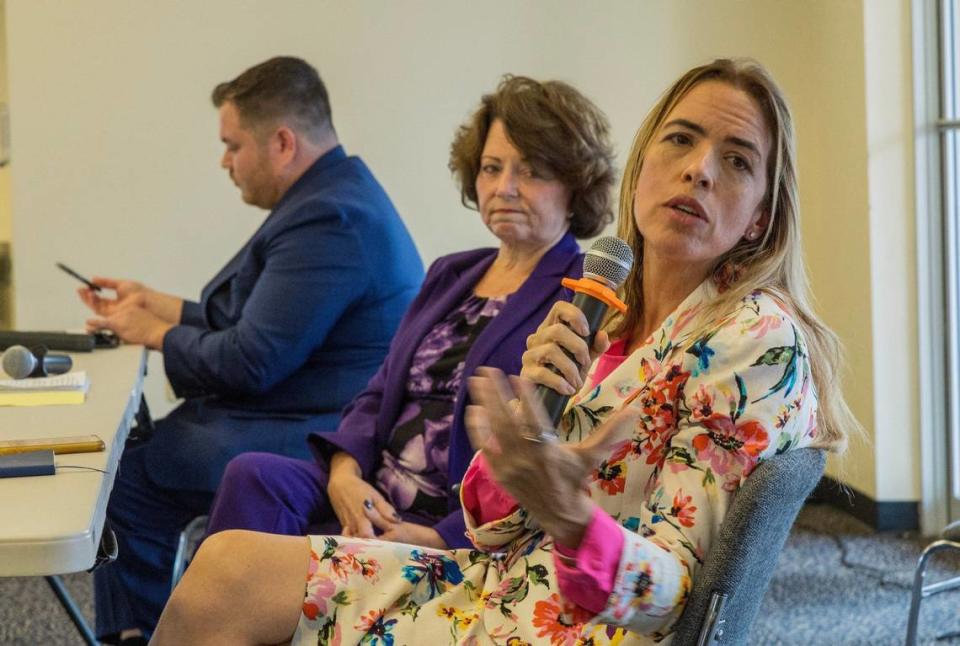
District 7 spans the southern portion of Miami and parts of Coral Gables, as well the municipalities of Key Biscayne, Pinecrest and South Miami.
The 2020 rematch for the District 7 seat is getting brutal and personal.
A mailer from Lerner’s campaign states “Greedy Developers Love Raquel Regalado.” An attack mailer against Lerner funded by Fighting for a Better Miami-Dade, a committee tied to conservative groups in Tallahassee, has a giant finger pointing a photo of the former Pinecrest mayor with the statement “This is what bigotry and intolerance looks like” and claims Lerner’s attacks against Regalado are anti-Hispanic.
Lerner’s launch ad in the fall replayed a clip from an attack ad against her in 2020, which showed footage of Pinecrest meetings where Lerner snapped at residents. “That’s me,” Lerner said in the new video, saying she lost her cool then and remains angry when it comes to corruption.
It also sought to associate Regalado, the daughter of a former Miami mayor, with a string of corruption allegations tied to city officials, including Miami Mayor Francis Suarez, Joe Carollo, a current Miami commissioner, and Alex Díaz de la Portilla, a suspended commissioner.
Regalado has no link to the allegations against them, which involve Suarez working for a Miami developer, Carollo allegedly instigating city enforcement against a rival’s businesses, and bribery charges against Díaz de la Portilla.
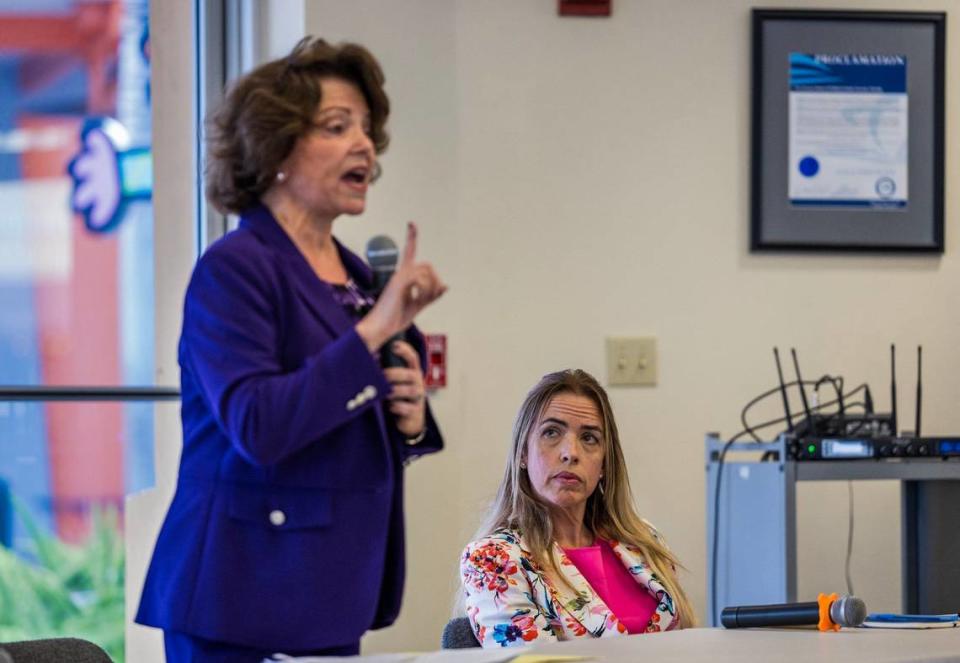
The Lerner ad shows images of the Miami officials over Lerner stating: “We can stand up to Raquel Regalado and the whole corrupt Miami system.”
In an interview, Regalado described the attack as an attempt to tar her with corruption through her shared ethnicity with the Miami office holders. “The messaging is: Cuban-Americans are corrupt,” she said. “Therefore, Raquel Regalado is corrupt.”
Lerner pointed out she is endorsed by Save and the Southern Poverty Law Center, two anti-discrimination advocacy groups, in denying the ads are anti-Hispanic. “That’s playing an ethnicity card that isn’t there,” she said.
At a Thursday meeting with the Miami Herald Editorial Board, Lerner said she was comparing Regalado to the Miami officials because the commissioner’s acceptance of campaign contributions from developers represented corruption. She called the attacks on her “beneath the dignity of an elected official.”
Regalado said she planned legal action against her opponent. “I am going to take you to court because you are impacting my life,” Regalado said. “I am not corrupt.”
Regalado faces a second challenger in Richard Praschnik, who works as a police officer for the county school system and holds an elected seat on an advisory zoning board known as a community council. He has raised about $22,000 for the District 7 race. He’s promising voters to be a strong voice for the Kendall suburbs.
“One of the main reasons I’m running is because we need more attention,” Praschnik, 28, said at the June 27 forum held by the Kendall Federation of Homeowner Associations. “Kendall has been abandoned by the current commissioner.”
With three candidates in the contest, the election could extend past August. There will be a November run-off between the top two finishers if no candidate wins more than 50% of the Aug. 20 vote.
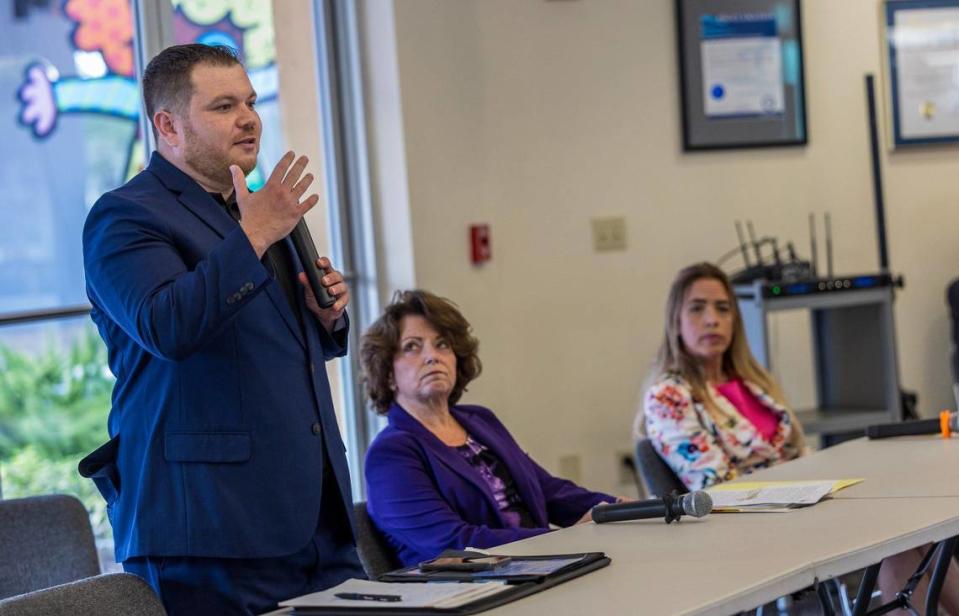
The 2020 election was decided in a November run-off, with Regalado winning 50.6% of the vote to Lerner’s 49.4%, with 1,301 votes separating the two out of nearly 105,000 cast.
In 2020, Lerner had overlap with the political operation of Daniella Levine Cava as she ran for county mayor that year. The two Democrats shared a campaign consultant in Christian Ulvert. This time, Ulvert isn’t involved in the District 7 race and Mayor Levine Cava has teamed up with Regalado in their campaign to close down the Miami Seaquarium, a District 7 attraction on leased county land.
Regalado has endorsements from the mayors of Key Biscayne (Joe Rasco), South Miami (Javier Fernandez) and Pinecrest Mayor (Joseph Corradino), plus multiple labor groups representing public-sector workers, including Miami-Dade’s police and fire unions.
With Lerner and Regalado’s campaign coffers driving the advertising and turnout operations, the divide over the incumbent’s legislative record forms a key fault line in the race.
Here are a few of the topics at play:
Urban Development Boundary
Regalado was the swing vote in 2022 allowing Miami-Dade to expand its Urban Development Boundary for the first time in nine years, a change that environmental groups fought and Mayor Daniella Levine Cava tried to block. Lerner, endorsed by environmental advocates, including the Sierra Club and the Florida-based Vote Water, called the vote approving a new warehouse complex in southern Miami-Dade a loss for the green movement.
“I would have never ever considered expanding the Urban Development Boundary, especially for a project like that,” Lerner said at a July 18 forum put on by the Miami Foundation. “It was a very dangerous opening for other developers to do the same thing.”
Regalado defended the vote as a positive for Miami-Dade after requirements she negotiated concessions from developers for paving over the farmland, including contribution of more than 200 acres to the county’s preservation bank of wetlands and other sensitive areas, known as the Environmentally Endangered Lands program. Environmental groups condemned the vote as taking away farmland that could have been used for future Everglades restoration drainage projects, but Regalado called it a good trade.
“It was a site that had lot of contamination and a lot of issues,” Regalado said at the Miami Foundation forum.
Praschnik told the Editorial Board he would have voted against expanding the UDB, which divides suburban development from rural farmland and the Everglades.
“There is plenty of land we can develop inside,” he said. “There’s no reason to extend the line.”
Development in Miami-Dade
Regalado was at the center of a 2021 debate over allowing GL Homes to convert the Calusa golf course into a residential development with 550 homes, a plan that infuriated many of the nearby homeowners.
GL controlled the land south of Southwest 88th Street. County zoning rules allowed the conversion, but deed restrictions from 1967 required it to remain a golf course. Once GL secured enough releases from adjoining homeowners to allow the deed restriction to be lifted, the County Commission voted 10 to 2 to allow the golf course to be redeveloped.
Calusa sits in District 7, giving Regalado’s voice more weight in the debate. She voted with the majority, and later said developers like Calusa in the suburbs were needed if Miami-Dade is going to halt developers from expanding west with new residential subdivisions past the current UDB and close to the Everglades.
“If we want to protect the wildlife and water resources closest to the Everglades and our critical well fields, if we want to build a functional transit system and other urban infrastructure, we must also accept that our neighborhoods inside the UDB will change over time,” she wrote in an essay after the vote. She said she helped negotiate a county requirement for monitoring of a rookery on the property, addressing the top environmental argument from critics of the development.
Praschnik criticized Regalado for supporting the Calusa project. “When you have a county commissioner who says ‘yes” and vote for something that people living there don’t want, they’re not representing the people,” he said at the Kendall forum. “We have to make sure we support the community and we listen to them.”
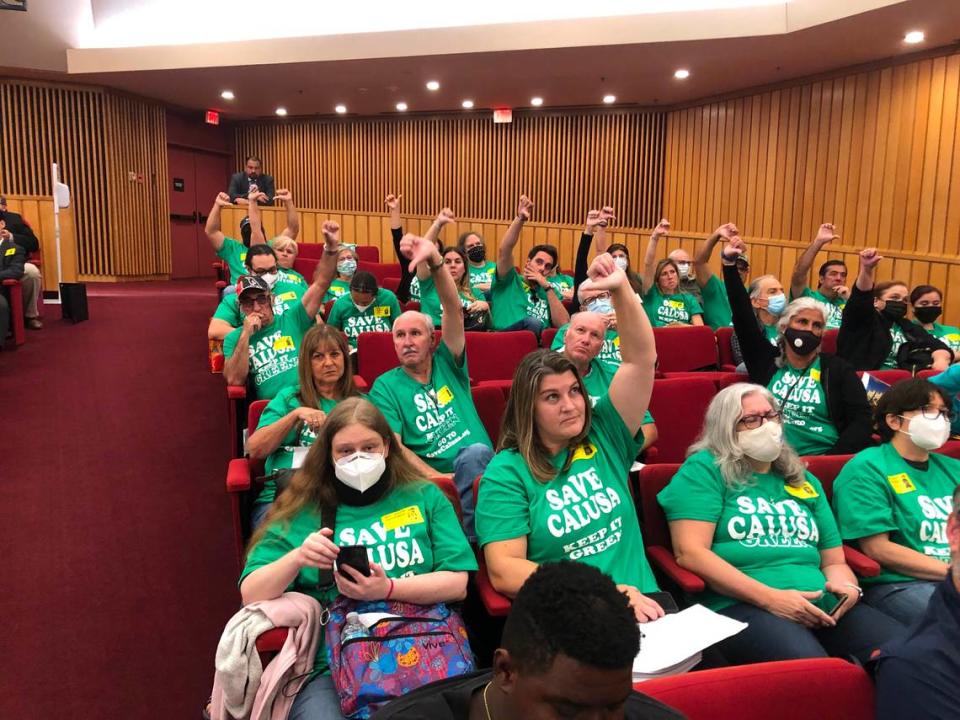
Lerner called Regalado’s vote a betrayal, and said the district commissioner could have generated a better result: “I would have negotiated for much less development” and said if elected, she wants Miami-Dade to offer to purchase the land from GL Homes following a Florida Supreme Court ruling that flaws in the county approval process requires another commission vote before construction can begin. “It would be a perfect place for parks,” Lerner, a married grandmother, said at a July 18 forum held by the Miami Foundation.
Septic tanks and the environment
One of Regalado’s top issues as a commissioner has been accelerating Miami-Dade’s effort to remove aging septic tanks that leak sewage into groundwater and Biscayne Bay as they fail — a problem made worse by rising sea levels.
Her office keeps a list of more than a dozen pieces of legislation Regalado sponsored related to septic-tank conversions, including mandating information on plumbing connections be listed on property data on the county appraiser’s website, a moratorium on Miami-Dade selling public property that isn’t connected to the sewage system, and modernized standards for new septic tanks that make leaks less likely. She points to legislation tweaking the county’s formula for a “feasible” connection distance between a new home and an existing sewer pipe to determine when a sewage hook-up is required over the cheaper option of a septic tank.
“We have an obligation to get rid of septic tanks,” Regalado said.
Lerner dismisses the Regalado legislation as not moving the needle on the county’s septic-tank challenge. “It’s a minimal impact on what we’re experiencing in terms of contamination,” she said.
Coconut Grove Playhouse
Lerner and Regalado are divided on a fight over the future of the Coconut Grove Playhouse, an epic dispute that was well underway years before the 2020 election.
Regalado backs the county plan to demolish most of the state-owned playhouse and create a modern 300-seat theater complex behind the restored facade and front section of the original 1927 building. Lerner supports the rival proposal to restore most of the original building and allow for a larger theater, with more than 600 seats.
The county’s plan has been stalled long enough that opponents once were in talks with Kevin Spacey to run the larger, Broadway-style theater proposed there. (That idea, floated nearly 10 years ago, fizzled before Spacey faced allegations of sexual assault in 2017.)
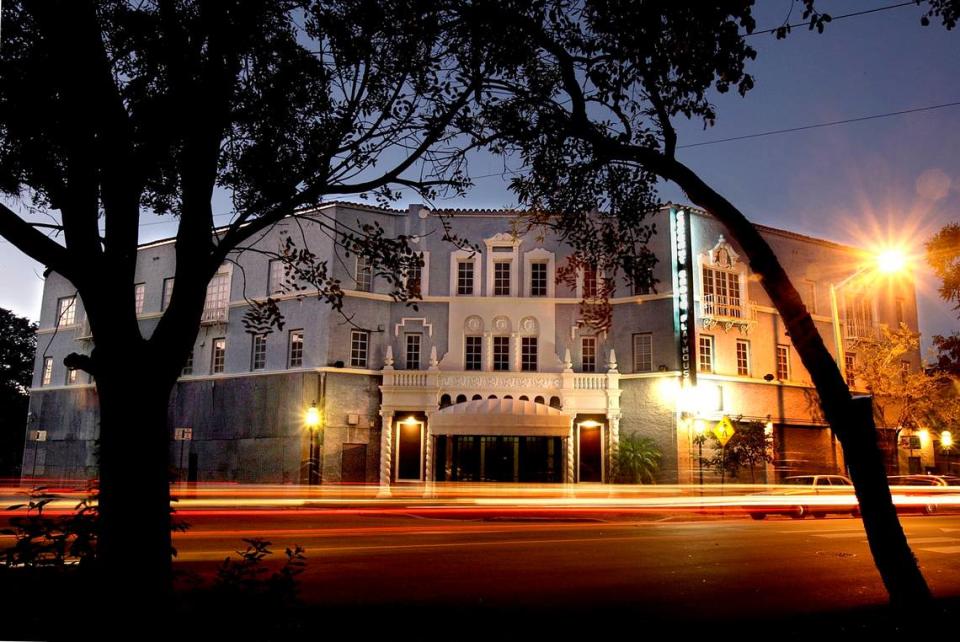
Miami Mayor Francis Suarez pushed for larger theater, despite arguments from the county’s cultural arm under the previous Miami-Dade mayor, Carlos Gimenez, that going big at the playhouse would cause too much financial strain.
“Regional theaters do require a certain number of seats,” Lerner said at the Miami Foundation forum. “I am committed to restoring a regional theater.”
After negotiating a settlement with Suarez and city leaders, Regalado said she won support to tweak the county’s plan to make it a better fit for the neighborhood, including a pocket park for the residential neighborhood behind the property and a smaller parking garage than what the Gimenez administration had proposed. She told the Miami Foundation Forum that it’s time to move past the debate and bring shows back to the property.
“The debate is really about the number of seats,” she said. “We want to reopen the playhouse.”
